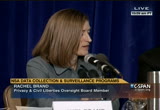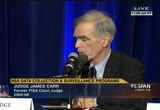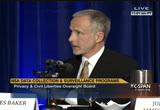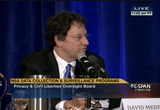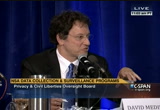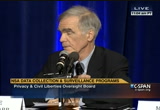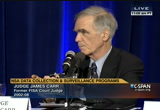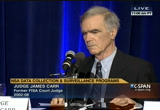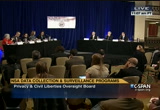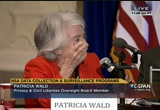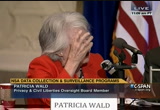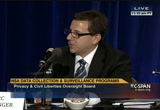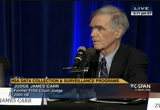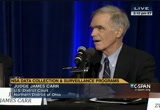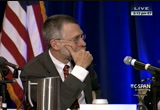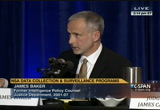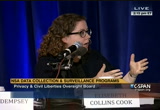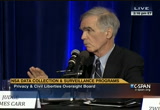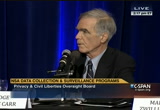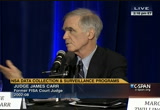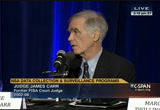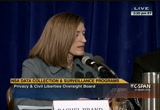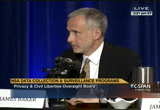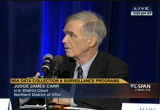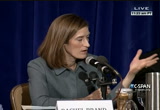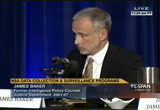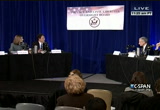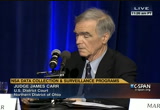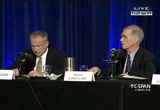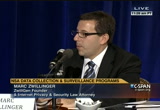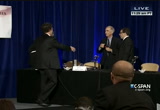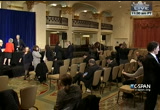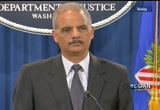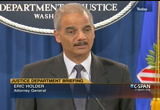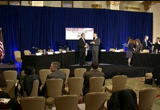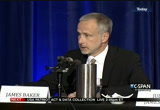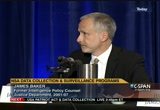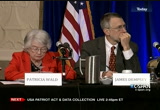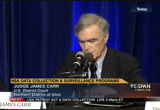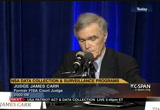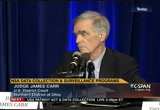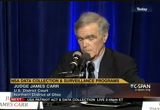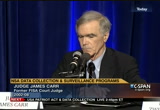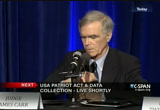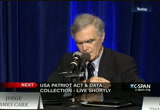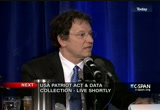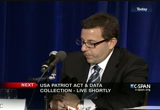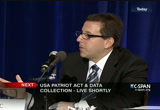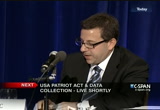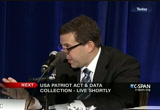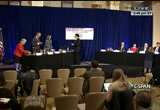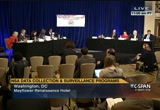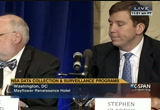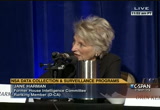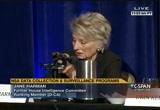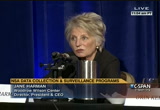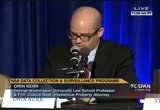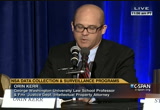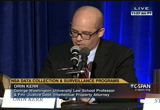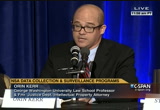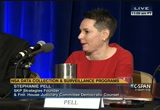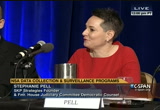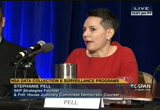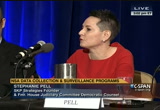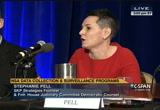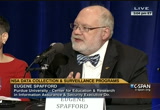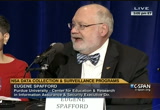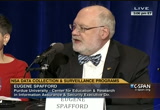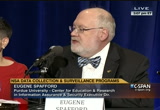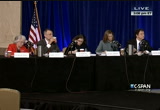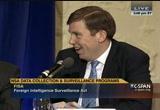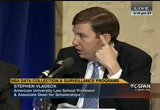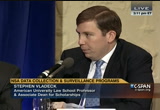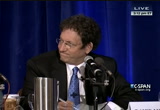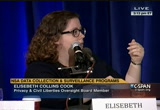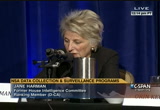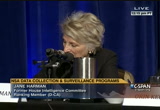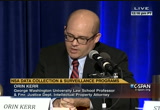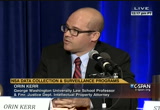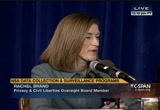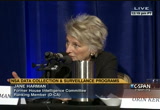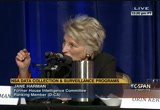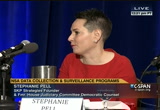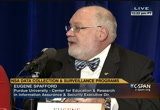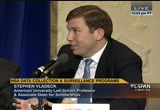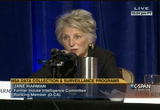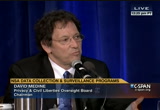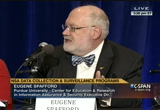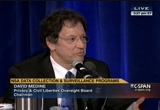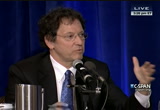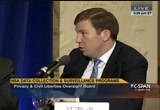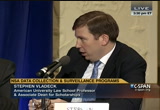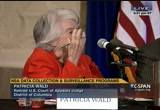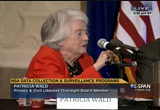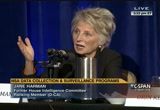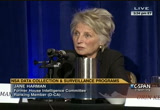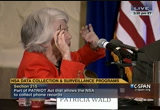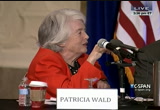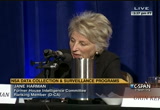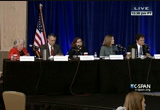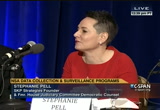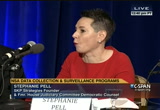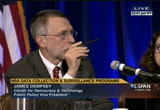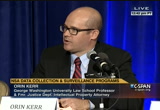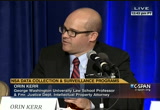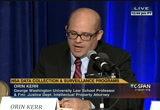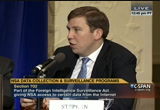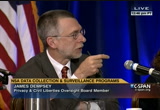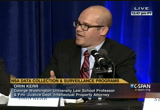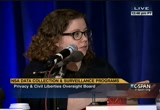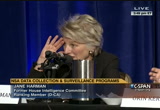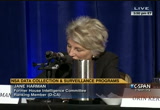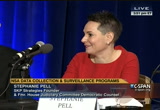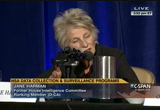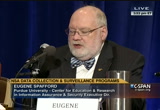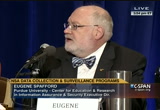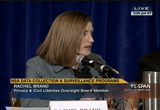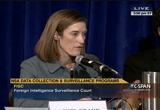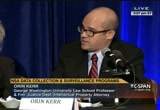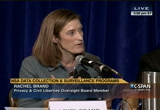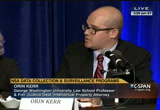tv Key Capitol Hill Hearings CSPAN November 4, 2013 2:00pm-4:01pm EST
2:00 pm
that he would rather not see summaries because that is not always a full picture. do you have a view about that? will there be a -- an unclassified summary versus a redacted summary? do you have an opinion about that? >> it all depends. ?hat is the issue doesn't really involve something -- and doessified it really involve something that is classified? can you recast it in a way? there is the likelihood at some point of publication of part or all of the decision, then certainly a judge could go into writing whatever he or she wrote and with that in mind,
2:01 pm
deliberately, apartment alive's and right -- compartmentalized and write about that. it might depend on the particular issue. it might be easy. it might be impossible. i like the idea of a summary. further details this is what is happening. i cannot really answer your question directly. i'm sorry. >> it seems to me you are trying to find balance between unnecessarily disclosing classified information that would harm us and providing adequate transparency for people to understand what is going on and have confidence in the system. it is a balance. on the one hand you don't want to have no transparency, and you don't want to have tv cameras in
2:02 pm
the courtroom either. is for at make sense couple of different options for the court to pursue or have available to give transparency to figure out what is the best fit in this particular -- each particular case. role of thehe person, whether an advocate or staff attorney or whatever when they appear before the court. and secondly, -- two questions. first, is there something that takes charge of everything the government proposes? and how do they evaluate which arguments to make? there are statutory argument, constitutional arguments -- how do they make those decisions and who guides them in their strategic decisions that they make? we will start with mark and go on down. think they should oppose everything the government
2:03 pm
seeks. the goal is this not -- the goal is not to make it harder for the government to protect the country. the goal is to make it simple for the government to protect the country while supporting the constitution and to have someone on the other side pointing out the constitutional balance versus the need for security or surveillance. as for how to decide what cases to get involved with and what arguments to bring, i think the first person to occupy the office should play a large role in figuring that out. it would occur to me that novelty is one thing. as far as focusing on when they should get involved, it is get about how they should involved. lawyers strategize. it is probably based on who their client is. how does each particular person
2:04 pm
make those decisions? >> to try to get at that in a short answer, i would think you have got it right as to who their client is. they view it either as the american public, or in some places, the human race that has some sort of human dignity and privacy in their communication. ther client is to offer perspective of those individuals who cannot be there tuesday for themselves as to whether the surveillance is -- who cannot be there to speak for themselves as to whether the surveillance is merited. it is hard to choose between them, but i would think they would be empowered to make both of those argument, statutory and noncompliant and constitutional. >> certainly, they would have the ability to make whatever argument they thought was appropriate, just like a lawyer in any other instance whether it is in trial court or appellate court. i would think the lawyer would do -- would be able to make
2:05 pm
whatever argument he or she thought was possible and credible, and perhaps successful. in a unique situation, calling to the government's attention that -- to the court's attention of the government isn't, if that lawyer thinks it is worthwhile. me -- and in the system i'm trying to propose, it could enable this -- lawyers often when confronted with new or difficult issues talk to other lawyers and get their import -- their input. what do you think? that is a natural source for where a lawyer would go. thes getting more elaborate further we talk, but on the other hand within the confines of what i'm suggesting, i think thisould also enable that small group, just like a small federal a look defenders office, they talk amongst themselves. they are privileged. nobody can make them disclose it. and you bounce ideas off each
2:06 pm
other. when these issues come up in front of the fisk, no one has been there before. you do not have precedent. and you have to think things through in a seminar kind of way. that is one way that lawyers would -- i'm sure mark does that with his client and others in his office. what do you think? that could be held. i don't think we have a template as to how that would occur, but again, that lawyer would have as much opportunity to raise whatever arguments the lawyer thought were appropriate as to government and classified information. and now when i think about it, at least within that small group talking amongst themselves and jointly coming up with how they go about representing. think that lawyer will be called upon to dream up arguments just to dream up arguments in opposition.
2:07 pm
but he will say, we have no opposition to the government's request, end of discussion. there are lots of issues associated with this type of function, office, whatever you are going to call it. it seems to me the one thing you would want to do is to make it clear to the people that this office is independent and can decide whatever legal position it wants to take in any particular matter. constitutional issues, statutory , he would haver to leave it up to the people in an office or whoever it is going to be to decide which approach they will take. it has to be independent. >> we have time for another brief round. i've just got one question. i'm returning to the appeal question. i recognize that some of you have not really had the chance to research, or don't wish to
2:08 pm
comment, but i want to raise this question. we have been talking about the fact that the five the court is kind of a unique animal. fisa court is kind of a unique animal. it has been thought of as an article three court, but it has been pointed out that it has some sort of auxiliary function with approval. here is an argument i share with judge carr. this court inevitably must, and has, print out constitutional questions, questions of whichory interpretation, have to become part of our, to the extent that they are a disclose, part of our jurisprudence.
2:09 pm
that i think me is it is so important that not only do some of the fisk council have the opined on the constitutional service, but they are applying typical traditional article in a situation where the court is siding -- the threecosts siding article is in question. but it is devoid of one of the most important parts of article three courts, namely those who have an interest in the preceding not being able to have any voice. for good reason, and i understand secret see -- the secrecy involved for national security. but i'm trying to pick your brain as to any way to solve that question. because to leave this at the
2:10 pm
highest form of jurisprudence, namely constitutional questions and sometimes those with statutory construction, at a point when they cannot be unveiled in any other process that jurisprudence has even up to the upper tier, even to the fifth, some have suggested that kind of certification, that has had its opponents, too. do you have any positive thoughts? >> i will take a shot at it. i hate to keep coming back to the 2008 court of review case, but the government was making the argument that there were not any providers to challenge. in the court ruled that since for them and writes words day, litigating on behalf of the users was not a constitutional standing doctrine. it had put in a provision for
2:11 pm
providers in section 702. i do not see the hurdle as quite as insurmountable. hase agree that a person fourth amendment rights and they were to litigate that on their behalf, it is a question that congress can wait, not a strict constitutional one. at least, that is my interpretation and my offer of help. >> i'm not sure i fully understand the concept of prudential standing. seems to me there are a couple of different circumstances. one may be that there is a target, a person named in the order. and that is easy, you can -- or it seems to me that person could be designated to represent the interests of the person affected by this order. i think that is what you are saying. they have bona fide interests. and there is a scrap of document able to bet be
2:12 pm
commented upon. you have a situation where there is capable of repetition, but it will delay your views unless you , even thoughdecide arguably the particular circumstances now move. also, congress gives courts its jurisdiction. >> congress created the original fisk, and it in a sense, you might say, that -- decided that this body of people could not become a regular participant if they had terrorist -- pre-k's -- >> and it begs the question, can a court oversee any roles like these? and they all agreed that fisk is a good thing and five is a good thing and we don't want to push it one way or another -- and
2:13 pm
fisa is a good thing and we don't want to push it one way or another. keep in mind, although would take is the executive saying, no, we are not going to go along with this. reviewhe fisa court of and whatever it says, ultimately, the supreme court might say that the whole structure collapses. who knows? has never been tested and i don't think we want it to be. >> jim baker, you said in your opening remarks -- i hope i'm not misquoting you, but i think you said something along the lines of, we can go on as far as we can go with the five that fisa court.h the five them would you clarify what you are referring to? >> it was the outer limits of what we could reasonably expect the court to
2:14 pm
do. we should not think of them as some sort of super inspector general that is conducting free ranging oversight of the activities of the intelligence committee. constitutional issues with that. trained to do not that in that way. they play a different role. i am trying to set expectations. i'm urging you to set expectations in a realistic way with the american people about what you reasonably expect the court to do. the same with congress. the -- what can the members of congress and their staffs reasonably excited to do with the oversight of these agencies? it is primarily my view that the president of the united states can take effective management and control and oversight of the intelligence community. to theyou go back original point, look at structure 702. you have the court proving these
2:15 pm
procedures, several different types, different applications, but not really engaging in review of individual determinations and so on. i just think you have gone pretty far in terms of what you can ask it court to do to conduct oversight of the intelligence community. >> i have no other questions in this round. i yield. >> i appreciate the witnesses being here. it has been very helpful. oni do want to take you up advice you had given us earlier about legal advisers and what role they play. there is definitely a sense, and i mean no offense having been a law clerk, but the fees for junior attorneys having been law clerks, i wonder if you could talk more about who the legal advisers actually are and what role they serve. >> when i started in the court in 2002, there was one legal advisor. when i left, i think there were four or five. i can't remember.
2:16 pm
clerks noreither law magistrates. it is a unique role they perform. i think i can speak for myself when i say -- and i'm the author of the treaties and surveillance, so i know more than most of the judges going into it, but they know more about the workings of the agencies than any individual judge can. we rely upon them to assist us in making decisions. to give you an example, they get by fisk role, seven days before we get, and application, and they will read through what is called the read copy. and jim will confirm there is a lot of legal push back between the legal advisers in the court and the oi pr. i know from personal experience there is a lot of pushback and thethe oipr
2:17 pm
agencies. someone said this morning that they don't want the junk, because if they do, we will lose confidence. it will be much more difficult unless they are straight up with us. -- and legal advisers not infrequently, i would come in and have, let's say, x number of cases sitting on my docket, and that number grew substantially well i was there. case,would be told, this that case, and some other case would be off docket. it would not be formally presented to me for review because of the interaction between the legal advisers and the oipr attorneys, and the agencies. that was a core part of their rigorously doing the applications. one of the things that i think
2:18 pm
should be considered would be than -- the instances within which an application should be submitted to a legal advisor, but never submitted to a fisc judge for consideration. should be too, registered and recorded and published. , but jim,rcentage, no would you agree with me that fairly regularly cases would come off docket yet >> or they would come off and be replaced another week because they were trying to resolve and finish the analysis. >> right, but i don't think it would be difficult to give every read copy a number. and then if it comes off-topic -- off docket and they decide never to presented, then nothing else shows that the rate of rejections in terms of the
2:19 pm
overall operation of the court is higher than a simple turn down by a judge. but to say that these are law -- they occupyow a unique role. they work for the court, but in a very important way they help to ensure the decisions that we make. very often, they would write a memorandum for us about some aspect or other. and then we would sit down and read these things. and they are not two-page search warrant applications. they are 40, 50, 100 pages. they are very thorough them every bit as lengthy as a title iii. oipr and say,ll would you give me this or that? on occasion i would have hearings.
2:20 pm
i would question the agent and the lawyer under oath flow -- under oath. and i would make a finding and determine that my questions had been answered. >> thank you, all three of you, for being here today. part of what we are doing here educatepting to ourselves, part of what we are doing is attempting to educate others who may be thinking about this. so i appreciate the thought and time you have put into your answers. >> and certainly, speaking for myself, if there are other questions that the agency has, we would be happy to answer them. >> thank you. i want to follow-up on something i had asked the government about and we did not get into a full answer on that panel. jim, i think you are in the audience for the discussion requirementse were
2:21 pm
that the government submits to the fisk after the fact, the phone number is now a selector in here. the paper trail is the basis on which the selector is established. what would the court do with that? would this be an actual check on the system? would it overwhelm the court? could either of you speak to how that would work? >> i don't see how it would overwhelm the court. >> it would or would not? >> it would not. you have a spreadsheet. you write down the selector. you write down the date, time, all of this stuff. and it is not too onerous for the government to comply with. i think that is a real issue. and i would imagine if the court were to look for real patterns.
2:22 pm
if things were to go along that is -- in a way that is consistent with the understanding of what they are thinking their approval is, that i would have to say that is in check. i do think it would be useful for the court to have additional transparency. and it seems like something that would give the american people that what confidence is going on is legitimate and appropriate. >> to do that, first of all, the periodics of the reports that all judges get through the wiretaps. again, it is all on the record x rte.ake -- ex pa if you are doing a good job, minimization -- if you are not. seems for it to be useful, you would to go back to the particular judge who issued the
2:23 pm
prison order, whatever the order was. >> 215. >> 215, yes. to go back to that judge that gave the original authority, rather than whatever judge happens to be there that week. .gain, i don't know but i suppose, in time, any judge would have developed the familiarity to be able to have developed reasonable articulation of suspicion in this context. >> and there was some discussion and back and forth about the courts and the lawyers in the government. can you talk about this back- and-forth that happens within the government? is there a quiet sigh adversarial -- a quiet the adversarial process within the government? can you talk to that? >> it depends on what kind of communication, whether with the fbi or the nsa. with the fbi, you have review in
2:24 pm
the field office. you would review at the fbi justiceters or, to the department and have a review there. and it would go to fisk and you would have a review there. and thee review meticulousness and the care that people put into these things is substantial. of dialogue back and forth between every level, among every level with this. there is back-and-forth with doj and fbi. i always took it as a huge amount of my response ability to make sure that i maintain at all times the credibility of the justice department in front of the five the court -- fisa court for muscle it was transparent what was going on. and when we made mistakes, as we did, we brought them to the attention of the court and we
2:25 pm
tried really hard not to make mistakes. it was really the justice doingment in my opinion his job, executing its responsibilities to order the constitution and the delegates were there to make sure that the properly.ecuted we will do our best to make sure it is enforced in the right way. if they have not met the standards, we will tell you if they have not met the standards yet, and they have to x, y, and z to do so. i think the system has worked well so far, but it is clear to me now and painful to see that some population of the u.s. is -- does not think that. we've got to figure out how to deal with that. that is your job. >> thanks. just one final question. the point we made earlier that this outside party advocate makes is that i have a role in compliance reviews.
2:26 pm
what role would that be e and how -- what role would that be? and how would that play out? many times, -- this is really quite straightforward and simple. but in the event that you had something that was more complex and you wanted to be really sure the problem had been identified and addressed and would not that, but again, i think at least the fisa judge should have the opportunity to have the toependent counsel and participate in an adversarial mode with the government prosecutor and conduct a hearing , like we do with a suppression hearing or whatever, and then make a decision. one would hope that the decision would ultimately be ok, things are not as bad as they look.
2:27 pm
and things have been fixed. but i do think there would be a for the attorneys to participate in the process from time to time. >> do you have numbers on that? >> it is not a career enhancing move for somebody in an agency to make a mistake, to get it long -- wrong. and one of the things that impress me as a young magistrate at the -- about the effort bia and -- about the fbi and cia so forth, one thing i can assure you has impressed me from day one with all of my activities with the fisa court is the people who do this work want to get it right. not just the lawyers in the justice department, but the agent out in the field. and the other thing i want to
2:28 pm
say -- and i have alluded to this before -- i know that at least the fbi on a frequent occasion was not happy with them because they were not going forward to present some that the euro very much want them to. adversarial relationship, but certainly not hand in glove. at least when i was on the court, one did not have the sense that they were presenting anything the agency wanted. >> i would be very careful about using the independence of this office to start getting involved too far in what would possibly lead to the capture of executive branch activity. we believe there is some role be on this process, some role that most advisors have found to be brilliant and play. and they should not look to play too many roles in this so they can challenge the independence of this. >> i want to thank the panelists
2:29 pm
. we will take a break and resume at 2:45 p.m. >> may i say one thing that occurred to me this morning, and also before the senate judiciary committee? let's all keep in mind the remarkable country we live in where we are having these kinds of -- conversations. i don't think any other country has anything like it. can you imagine this kind of conversation occurring anywhere else in the world? i think we should all keep that in mind and take pride in that. >> excellent point. we will take a break. thank you. [captioning performed by national captioning institute] [captions copyright national
2:30 pm
cable satellite corp. 2013] >> we will bring you back to the board for more live coverage after the break. this is an independent board that is examining clandestine u.s. surveillance programs. the five members of the board that we have been hearing from, they are appointed by president obama but report to congress. they are looking into what changes need to be made in the nsa surveillance program. when they return, we will hear from the ceo of the wilson center, jane harman. she is also a former ranking member of the house intelligence committee. . the board has no set recommendations for giving its recommendations, but has been meeting with months with security officials to scrutinize its impact on civil liberties.
2:31 pm
we'll be coming back to the rest of the boards discussion about 15 minutes or so. in the meantime, a look for a couple of minutes about what attorney general eric holder had to say earlier today about the nsa program. the quick question on surveillance issues. there has been a flap in the last week or two oversees about u.s. surveillance -- practices. about 80% of the work that the nsa does is outside the u.s. and guidelines that be do you or your predecessors put in place. are you looking at whether those guidelines provide any protection for national -- international -- foreign or are you just rummaging through their communications yucca >> -- their communications? >> we are in the process of
2:32 pm
making sure that we are respecting an appropriate balance between keeping the american people safe and our allies say. we are in conversations with our partners in europe and other parts of the world to make sure that we strike that appropriate balance. there are some fundamental questions that i think we have to ask ourselves, simply because we can do certain things does not necessarily mean we should do those things. the chiefo be question that must be resolved. what is the cost and the benefit? what are the benefits we are receiving? what are the protections we are , against the privacy that we necessarily have to give up. that review is underway. it is a thorough review. the president is fully gauged in that review them as our other security team.
2:33 pm
in a relatively short amount of time we will have an announcement to make. >> [inaudible] >> the concerns that we have here are not only with american citizens. i hope that people in europe will hear this, members of the eu. privacyerns go to their considerations as well. we are looking at this in a very holistic way. attorney general eric holder there on the nsa surveillance programs. we will be back live with the privacy and civil liberties oversight board meeting here, talking about changes possibly needed to the surveillance programs being carried out by the nsa and other agencies. when we return, we will hear center, janeof the harman. if you want to go back and watch the earlier sessions, you can do so on our website www.c-span.org
2:34 pm
and just check out the video library. here are some of the board meetings from earlier today. >> thank you for inviting me back. it is an honor to be here to discuss these kinds of issues in this type of setting. i appreciate the opportunity. i just have a couple of quick comments. the focus of our discussion is on section 702, the fisa amendments act of section 215 and the patriot act. areuld say, while these very important, statutorily authorized, judicially reviewed, warrantless surveillance rogue rams involving the collection of communications and communications related data with respect to americans, they are really only part of the story. we were able to discuss this in the morning panel that i was able to attend. in particular, the government conducts surveillance using a number of authorities, including
2:35 pm
outside the united states using executive order 12 333. i would hope that as you are evaluating these issues, think broadly about them, because the privacy issues that you are confronting do pop in and out of different contexts. respect to telephone records, telephone calling records, there are several ways, 8-10 by my count, and sometimes depending on how you count them, 8-10 different ways that the government can go about obtaining the same types of records when you are talking about 215. it is important when collecting these types of records, but only part of the story. i would urge you to think broadly. i would also urge you to think broadly because the topic that has not been discussed very much is cyber. and the need to think about critical privacy issues and the data collection issues as they pertain not only to counterterrorism and foreign intelligence, but also to cyber. i'm happy to talk about that if
2:36 pm
you are interested. the other quick point i want to make at the outset is having to do with the foreign intelligence surveillance court that i work closely with for many years at the department of justice. i can elaborate at links if you want me to, but in many ways i would say, not withstanding much of what has been written in the press, the fisa court has been a treasure -- a national treasure. it has done an exemplary job during wartime. that has not been said enough. i wanted to say that at this point. however, the fisa court is not some type of super inspector general over the entire apparatus that we have to collect intelligence. that is multibillion-dollar enterprises conducted by thousands of people. that is not what the court does. 215, ispect to 702 and think we have reached the outer limits of what you can reasonably effect a court to do in this setting.
2:37 pm
i'm happy to discuss that at length. at the end of the day, to my mind it is the responsibility of the president, the executive branch, and the congress to conduct management, oversight, and control of these types of activities. i'm happy to talk about transparency and the issue of whether we are going to have an advocate or some like that in the questions. >> thank you for coming back with us again. judge carr? i like jim bakker, with whom did work for five or six years, i cannot call if you left before i did or not, but in any event, i'm pleased to be here. you may be aware as a result of an op-ed that i happen to publish on the 23rd of january i think it was, it may be what i consider to be a very modest for proposal, which i will repeat this afternoon.
2:38 pm
having to do both with the process in certain applications of the court, and it will perhaps, enhance public confidence in some of the decisions the court reaches. that proposal is quite simply, that congress give the fisa ,ourt judges either discretion or perhaps direct them to obtain the services of outside independent counsel when the court is resented with something that is new and novel. this would happen on very rare occasions. one of the things i want to emphasize is how infrequently this type of representation would be necessary. the vast majority of fisa applications are simply fact- based. there is a very low rumble cause standard. the probable cause showing, working on behalf of a terrorist
2:39 pm
or terrorist organization, once that is established, we do not have to give other government reasons. to that extent, it is very much like a search warrant or title order. but on frequent occasions i follow the sitting judge, and when jim baker was the one to come and say, you better pay attention to paragraph 62-73, because there is some thing that is unusual about this that takes it out of the ordinary, straightforward routine fisa application. the government would do that, and for good reason, because it knew that we had to trust its integrity in order for us to function effectively and have confidence in what they were saying to us. caught airement became fight in the first draft of 2008 of the foreign intelligence committee rules. and the government is required by those rules to call that
2:40 pm
court -- that circumstance to the court's attention. it seems to me that would be the trigger point for a judge to exercise his or her discretion, or for congress to mandate when that rule is given that the court calls upon what i would envision to be a very small cadre of precleared attorneys, probably in the washington area, probably with some sort of experience in this area -- i would certainly hope so, so they don't have to spend a lot of time learning how the wheel turns, as it were. but that individual could called -- could come in when called the interestsent of the constitution, the fourth amendment, and the rights of all to communications privacy. but it would be very infrequent when this would be necessary.
2:41 pm
again, i want to underscore that. benefits to the court enter the process would be quite substantial. first, we judges are custom to how we work with the adversarial process. what do you say? what do you say? that is usually how we make decisions in most of what we do. secondly, when the government wins, when the judge says, yes, you can do this or that, it has no interest in appealing. it doesn't need to get that order reviewed. if not going to go to the fisa court review and say, by the way, we won, but nonetheless, look at it. however, in that circumstance when there is a new or novel technique or sudden other aspect where the court has called upon counsel,dual outside then that individual would be
2:42 pm
able to appeal and secure an appellate review, which does not currently exist. and the appellate review, certainly in my function as article three judge, is very important. there are times i get reversed. and when i get reversed, i say, oh, my gosh, i was wrong. that first op-te ed piece, it seems to me that this outside counsel, i have not really got a name for it yet, could also perform an important role when there is the troublesome issue of noncompliance. once again, the government is required to report instances of noncompliance. they did so when i was there. and in every one of those instances, it was fairly trivial. it was not troublesome. however, the presiding judge, judge bates, in his lengthy opinion suggest that there may ofreports where reports
2:43 pm
noncompliance are once again before the court, it might be useful to have the ability to reach out to someone to assist the court in understanding the issues and ensuring that what and isong has been fixed not have any serious cause to it, or if it does to see if that gets fixed. at some point, i will talk about the role of the legal advisors, because their work is absolutely crucial. i don't think it is very well understood by anyone outside the court. and the role that they play is extremely important. perhaps i will have a few minutes to talk about them and their role and where it fits and everything. and one final thing, and jim sort of alluded to this. that we should all keep in mind when talking about foreign intelligence collection,
2:44 pm
the function of those agencies charged with that responsibility, and then the judiciary. it is a very limited at to the under the foreign intelligence surveillance act. if you look at article two, and of course, that is the article in the constitution that establishes the office of the president and give him his responsibilities and authority. you don't find the word judge in there at all. this is a unique circumstance where the third branch plays a role in overseeing the activities of the executive. area in which the executive constitution has exclusive sponsor ability, the conduct of our foreign affairs and protecting us against foreign dangers and threats. i look forward to your questions. once again, it is a pleasure and honor to be here. you.ank >> thank you for inviting me as well, and especially seating me on the same side of the table as judge car. it might be the same -- the
2:45 pm
first time we have been on the same side of anything. for the past dozen years i've helped clients respond for customer to man's for criminal data. my clients range from small app providers to large companies like apple and yahoo! my comments are entirely my own and not on behalf of any client. has said, my client work given me unique view into the position of service providers who receive demands under fisa and have helped me see two aspects of the issues that are inconsistent in our legal system. first, the overbroad secrecy that applies to everything related to my and the lack of a true adversarial process. together, these pose difficulti es for providers with regard to the public. to begin with, for writers receive an entirely unfamiliar
2:46 pm
process containing very few specifics. based on a mere glimpse, they are being compelled to disclose the most private user communications they carry. and due to secrecy, providers have few places to turn for advice. for writers with limited resources struggle to even understand, much less react accordingly, to the prop -- to the request that they get. yet her biters are the only party in the stature to a -- in to asktutory authority questions. right now, they are the last bulwark in government overreaching. the court has not given authority to do a full review of the 702 directive unless a provider first initiate a challenge. but it decision of a provider to
2:47 pm
challenge must be made alone, , withacute time pressure little knowledge of what is at stake and and or gag order. and when they do try to challenge and meaningfully litigate in the fisa court to my it is an uphill battle. even now, the rules have barely been tested. the logistics of handling a veryified litigation are difficult. and filing documents with the court has always kind of been like trying to get a letter to santa claus, a lot of blind date. -- blind faith. and there are papers that a provider is not resented -- not allowed to leave -- and there are papers that the provider is not permitted to read, even when requesting court. to oppose the release of information, the government has made a secret filing as to why , harm that would
2:48 pm
outweigh their interests, but they cannot see that filing. it is hard to respond to something you cannot read. which means that even in the adversarial proceedings, the court is still only hearing one side of the issue. in light of these issues, i think we are relying on providers to have secrecy and fight in the court with one type -- one hand tied behind their back. which is why big creation of a special advocate, one you would have the same access to classified materials of the government, could make a real difference. are used to making decisions after hearing both sides of an argument. that is way -- the way our system is structured and that's what makes them informed damage amid. -- and legitimate. what --r side is represented. the advocate can weigh in and
2:49 pm
serve as a potential resource for providers who want to challenge the compulsory process. we need to look no further than some of the odd logic and recently declassified decisions to see what happens when the court and the government work through the issues without allen's of input. even if -- without the balance of input. even if the outcome would not have been any different, having access would instill more faith in the process. >> that was from earlier today. back now live to the privacy and civil liberties board, second session. we expect to hear from jane harman, now the ceo of the wilson center. she will share her thoughts on the u.s. surveillance program and whether it needs to be changed in light of spying on citizens domestically and worldly readers abroad. we will take you there live
2:51 pm
>> we will be starting the final panel, which involves academics and former members of congress. i'm pleased to be joined by jane harman, a -- jane former member of congress. and a professor at george washington law school. and the principal with key strategies and former federal prosecutor. and eugene stafford, professor of computer science and insurance security at purdue university. the university.
2:52 pm
we will do another round of five minute questioning after introductory comments. >> my apologies for being a few minutes late. but i'm glad to be here. i consider myself one of your grandmothers. i was a principal co-author of law of 2004,nce which established you. and one of the tragedies, i think history will record, is that you were not fully functioning until may of 2013. that is about 8.5 years lost of a very critical mission. let me just say that a goal in the law, certainly my personal goal was to have in the law certainty that liberty and security were reinforcing values in the policies and practices that we established under the law. is -- if ever that
2:53 pm
function were needed, it is right now. me that youunate to were one of the best kept secrets in washington. i know you are making a massive effort to get out there and i commend you for it. urgenthink the need is and you, uniquely among the different groups in looking at arepolicies and practices, able to make sure from the inside that we are doing the right things. let me make two other points. germanyas in berlin, , a week ago today, at , dinner for top policy types think tank leaders, and business people. all of whom were shocked and horrified by the revolution -- europeanns revealed in newspapers. when i told them that i was testifying next week, they
2:54 pm
looked stunned. and they said, gee, that is wonderful. i hope that a group like that will also be in touch with foreign governments. so i put that out there. i'm not sure if that is in the mandate or it is not, but it might be interesting to think about connecting to those folks and may be forming some common cause about ways to look at the practices and procedures of different countries. and finally i will offer my .bservation about this our government needs crisis management 101. it seems to me as a politician that when bad stuff is coming and i were just imagine that when some guy named snowden is taking all of this information from the government and ruling it out, you get a
2:55 pm
frame in the context and you talk about what else can come .ut and what it means this is just free advice from someone who spent 17 years in the u.s. congress. some crisis management function from our government at the highest level could be helpful, along with a robust privacy and civil liberties board. i have been in this game for a long time and i passionately hope that things turn out well for our country, and that we have both security and liberty to look forward to. >> i am professor kerr. thank you for the invitation to testify this afternoon. the fisa statute is premised on a search warrant model, putting article three judges in the position of evaluating search warrant applications. and that model is not working, because the search warrant model is premised on the judge serving essentially an admin -- and in
2:56 pm
role.erial the judge is not trying to conduct a conference of review of whether the statute is being abided by correctly, what it may determine, and what the consequences might be of the warrant is issued. that does not work in a high- technology area, because technology is simply changing too quickly. judges are, therefore being uses of resolve typical interpretation, which they are not equipped to answer in this antext, a context such as search warrant application. this was discussed earlier this ,fternoon at the earlier panel ways to restructure and make amendments to the war and model. a special advocate approach is one approach, encouraging disclosure. encouraging interpretation is another approach. both of those are interesting
2:57 pm
and promising ideas for how to reform the foreign intelligence surveillance act to deal with new technology. let me suggest two other approaches, one which has been discussed and implemented and the other which has not been. one is content provision. having the government authority last for a certain number of years, and then expire putting the burden on the government to secretly love that power. sunset provisions were originally designed to have testing to see if the government a fewneeds that power years later. today, in light of technology, it is a way to make sure that government has to go back to congress to seek approval for any new interpretations of the law. combining sunset authority with disclosure of interpretation that the fisk is taking is an important step. but another approach that has
2:58 pm
not been suggested so far is a rule of d for foreign -- rule ofleddity with in the context of the law. that judges should adopt the narrower interpretation of criminal law, and that implies that government should have a broader -- to have a broader interpretation of the law, they have to go to the legislature and enact it. the idea being that it is ultimately up to congress, not the court. this rule would serve a similar function. if it is a close call, the default should be for the fisa court to reject the interpretation and tell the executive branch that they have to go to congress to get approval for the interpretation of the statute. branch tohe executive
2:59 pm
go to congress and not seek who are notm courts equipped to analyze the enormity of the questions and the sunsets, essentially a provision and the rule working together to force the executive branch to keep going back to congress as technology changes to have congress approve or disapprove any new surveillance programs. >> thank you to the members of the board for inviting me to testify today. it is quite an honor. as a formery hat congressional staff member, i would like to raise to transparency points that i think tol raise -- will relate some of the discussion on earlier panels. we heard on a prior panel the idea that the fisk having had, or currently having a mechanism
3:00 pm
to seek review of an outside technical expert. i think that is an excellent idea, but it is an equally important resource for staff members and members of committee. my ex variants working on the electronic forms privacy act, which was not done under essentially working with classified information mama myself and my colleagues were able to contact outside experts, professors at universities, people who worked in the telecommunication industry for decades in order to get the view of current capabilities in where it was going in the future. it should not surprise anyone that the government's views did not comport with the views of the outside expert.
3:01 pm
the government as an advocate. a very important mission to do and present the view of technology in a way that west represents its position. what outside experts could do, in addition to getting a different view from government was helping the committee look to the future to understand where the technology and its capabilities were going so that in the course of trying to write would not become obsolete with the new iphone model, we have the necessary information for forward projection. secondly, and this point goes more towards the discussion on 215 and something the judge raised on the first panel about things that have been said in different press outlets by regarding therts
3:02 pm
fact that the government interpretation was perhaps novel or a little idiosyncratic, certainly not something that people who were perhaps experts and- surveillance law could read the statutes and say i could see how the bulk of authority would operate under the statute. what i would like to raise is a problem that occurs from a process level as a committee staff member, especially on the judiciary committee. certainly we hear classified information and often have three things behind closed -- three things behind closed doors but committee members interact with non-governmental state holders who have real interest in how these are written and how they affect the privacy and interest of the general public. when you have a situation that a government legal interpretation
3:03 pm
is essentially hidden from , the dialogueure that must occur between the staff and committee members and these non--governmental constituencies, sickly can be very dysfunctional, because when you discuss why you want to make a change with a statute but are not able to talk about what you think the change will do, it can the the effects of having governmental constituencies argue for changes in the law or reject proposals that are not in their interest. i think that raises a very problematic process question calling into question the integrity of the legislative process with respect to legal thatpretations of statute must remain hidden from public disclosure.
3:04 pm
law am not a scholar of the but of systems. find wayssystems and where they can be studied or bolstered. the first is we have heard about how carefully this is controlled. that it. the professor scrubbed the takemation we can perhaps that as given and relies we do have a number of people working very hard in the nation's defense and interest. privacy ised with the systems are constrained and controlled within a very small they can swing out of
3:05 pm
control beyond what is intended. this is by no means unusual given the history. this was used for political games that were later rolled unconstitutional. what we need to do is look at where are the points in which this can be controlled? where are the points we can observe to make sure the system cannot be subverted. we are lacking in the transparency. the fact that people who have the order served against them cannot talk about them, cannot areg them up for a court all considerable problems in terms of writing any wrongs or oversight. that should be addressed. in particular, we have heard how
3:06 pm
elected representatives are unable to hear all of the information about the programs, to engage the cleared staff and have conversations with each other about the issues involved. to my knowledge, we have not elected any terrorist to congress. we are not in a position where we have terrorists in the judiciary or operating isp's. from safeguarding those individuals, it is really counterproductive to the interest of the nation. i would suggest you look at that is one thing that might be considered. in general, i believe classification is overused. anything that is classified should be classified only to protect the safety of a party or for operational efficacy. it not -- should not be used to hide things from the american public.
3:07 pm
things that are classified when the american -- when they come out, the american public should not be ashamed of what the government is doing, and we have seen instances of that in the past few months. won't makecomment i us more technical. i circulated a set of fair information privacy practices that have been put together by the u.s. public policy council. good privacyvern and databases. i would ask that you look at those as you consider possible changes. the more of those upheld, the better we protect the privacy of information. the more information we collect, the more likely we are to collect noise, particularly if it is stored for a long time. in any system, the more we try to avoid false negatives, missing cases of things we are looking for, the more likely we are to generate false positives.
3:08 pm
there is a concern for the american public that in the process of trying to be sure we stop every care -- terrorist process, we cast the net that is likely to engage individuals that are involved in unusual but not illegal behavior. i will be happy to answer questions later. it is a pleasure to be here. brief.try to be very we have heard a lot today about the idea of a special advocate, so i thought i would focus my remarks on that proposal. i suspect members are familiar with a research report that was disclosed last week about constitutional concerns with the special advocate and thought i would briefly -- briefly address them. first, the report suggests a special advocate would raise article to problems with regard to the appointments clause and how that is set up.
3:09 pm
i think this is perhaps a non sequitur. i do not think there is any current proposal that would actually constitute the special advocate a something resembling what the supreme court referred to as an office of the united states. i think this is a bit of a red herring. of issues iscket concerns about adverse miss -- ness.se mis this has been an effect. the judge raised this concern as a possible rejection to fisa. i am happy to elaborate more on why i am not convinced this is a problem. i think the only relevant point is a special advocate would not exacerbate any adverse concerns that exist. that is to say, there may be concerns. having an adverse party only
3:10 pm
not make them worse. instead, i think the hardest issue raised and one i think that is the greatest head scratcher for the special advocate is the appeals question. the supreme court just said and proposition eight that a party must have a direct stake in the outcome in order to appeal an adverse decision by a lower court. i for one am pretty confident it is part of the article three court system. obviously, i think some of the current proposals would not invest with such a direct stake in the outcome. it seems to me there are two responses to the problem posed by the perry decision. the first is to create a direct stake. to have the special advocate. not representing a undifferentiated interest but to represent u.s. persons who communications might be thercepted or so went to
3:11 pm
surveillance being authorized. that might raise policy questions difficult to think about. certainly we have precedents for such separated representation. class counsel. class action. even for example, habeas corpus -- -- lawyers. one possibility around the problem is to create the direct stake. the other is to avoid it. i suspect there has been some discussion among the board about aboutea of certification the possibility of having the fisa court certified. this could be modeled on the decision.urt this allows for circuit courts right now to certify questions to the supreme court at any time and whether or not a party is asking for such certification. another possibility is to borrow
3:12 pm
a possibility from the bankruptcy context and bifurcate the decision into those that they are allowed to enter the final batter. in which case the court would be empowered to act finally. those in which it could issue a report and recommendation that fisao be confirmed by the court to review on appeal. that is how the bankruptcy court perceives right now. it is another way to get around the problem. the larger point is i think the appeal question should not distract from the advantages of having some kind of adversarial participation. even if we cannot ultimately solve how we will be allowed to proceed. >> thank you for joining us today.
3:13 pm
you see it over time emma both risk respect to the judiciary committee as respect to receiving reports, exercises and oversight function in addition to the intel midis. do you think we are in the right place right now in terms of congressional oversight. or should congress be taking a fresh look on how it exercises oversight capabilities.
3:14 pm
might make sense to go from i left to right. >> i think it is a great question and something that has to be revisited. i was there, working and the white house when it was passed in 1978. group thatart of the passed the bipartisan law but was impressed by the fact that the basis is robust functioning of all three branches of government. executive branch policy review the fisa court and overseen by the congress. that was the deal. that worked very well until 9/11 9/11 then the events of and the fear of ongoing 9/11 caused the bush administration to feel that we need a dramatically enhanced response
3:15 pm
.r aggressive approach they ignored fisa for a couple of years, which i found out afterwards. i was a member of the gang of eight and congress pushed back to catch up to technological change. fisa and other laws, patriot act and other things mentioned certainly executive board -- order 12 triple three are in place now. what is my basic answer to you? i think robust oversight is crucial. i think it should extend the on the intelligence committees although i think they have special roles because they have special understanding or are supposed to. i hope i did. of what the challenges are. of the reach of the programs, all members of congress should have some role in oversight. i think the challenge is that
3:16 pm
the change is in tech knowledge he. others on the panel know more about that than i do. very hard to craft either at law or oversight regime that can iphoneate what ipad or six will look like and what capabilities it might have. but what else will be out there that we cannot imagine or i cannot imagine. i am the grand mall. these kits can probably imagine it. can probably imagine it. >> this is largely outside the area of my expertise. one area that i think matters a lot is what is the reference point that congress is looking at the question from? so if there is a sunset provision or the pfizer board is taking conservative interpretation of the law, the
3:17 pm
executive branch has to go to congress and get something from congress, has to persuade. when the executive branch is an up position of needing to persuade, that is going to lead to better oversight than the opposite. if the fisa court is taking an aggressive interpretation of the difficult,relatively i think, for the legislative branch to get the kind of oversight it means. effectively trying to say what might be going wrong that has been approved by the fisa court? at difficult position to be in. one of the benefits of the sunset revision is it effectively means the executive branch has to go to the legislative branch and make the case of affirmatively. i think that will lead to better oversight. >> i will take the and of what professor kerr said and when the toislative branch has to go
3:18 pm
the other branches, the legislative branch has to stay engaged. if the executive needs to ask congress for something on a regular basis, members will stay engaged, it is going to be a priority. i think it needs to be a priority. thank you. >> enqueue. just to follow up on the question of congressional oversight. those of you who are here for the previous panel heard me ask about the proposal to return requirements where's the government would have to tell what they were doing after-the- fact. it is not congressional oversight but judicial oversight. i have a cynical view that it is a fig leaf and not professional oversight. so that was the reason for my question earlier.
3:19 pm
the same question about congressional oversight. very granule of -- granular. -- if it were increased to include very granular reporting, watch what congress do with the information, and does it enable a greater level of oversight the net are ready exist? are ready exist? >> if i were not an optimist i would not have served in congress for 17 years. i think it is a tragedy we seem to be basically in ordering the regular order of the committee process. even the granular stuff, they are very smart people, sitting right here.
3:20 pm
there are members who care about getting it right. yes it will take a commitment of resources to get it right. i think the challenge will be keep moving.s that it will change because the of our technologies and what the bad guys can do are evolving and keeping on top of that and understanding what that means and understanding what the requirements are, not just what does the law say, but who should lead be focused on and how should we be doing this? it might just in two years or 10 minutes not just be phone numbers and bad e-mail
3:21 pm
addresses, it could be something in the crowd that i cannot even imagine or something beyond the cloud. >> obviously you want reporting requirements for information to be useful, but without it, what can congress do? >> i found one of the most of theging aspects reform of criminal investigative authorities was just getting accurate information about how technology functions. often the government was using certain types of authorities. metrics forf dedicated staff and members, and they are there, is very useful, but if it is not there, where is the starting point? >> do you have a view on what kind of information that could be provided that would be useful? >> i wanted to add to
3:22 pm
that that reporting is not sufficient. with the technology and complexity, i can craft a report that says everything and means nothing to the people who read it because they do not have background. unless we allow those with expertise in the area and time in office, and largely a staff function, the ability to ask questions to be brought out to either the court or to elected representatives, they will not be able to understand what is going on with some of the very complex technical issues. i come back. i have this concern that reports have cap staff from being able to be briefed or aware of these things or to discuss it with members. many of the members have background in law where they do not understand the technology and depend on staff to help them get bits of information.
3:23 pm
>> i think there is also an incentive problem. everyone isgree working in the best interest of their constituent. the problem is when this all happens in the dark, i do not gow what the incentive is to down and spend hours and hours going through materials they may not even understand. last tuesday's hearing brought this out quite sharply. when you have the intelligence committee say it is not a violation of the privacy if you do not find out about it. the question is, how do we change that mentality among the members that are tasked with the oversight function? heart of that is not just underreporting and better opportunity to engage reporting but some mechanism to which it is more in their interest to exercise oversight, as opposed to keeping things under the rug. your question was
3:24 pm
not just about reports, i thought it was about oversight. oversight is much more than reports. it can be offensive to. i am told back in the day, michael o'neill read every single fisa application. read every single one. that is pretty darn good oversight, assuming he it when he was reading and a pretty smart guy, still around. that would be impossible now. too much going on. it seems to me the right people motivated the right way with adequate resources and part of that is the determination to focus. do not sell members short. some members are keenly interested in this.
3:25 pm
they can make it a priority to focus on this. i think we need a staffing pattern that enables members to do that. i think there are members that have been and are very conversant with oversight. >> earlier you said there was a concern that more information you collect to avoid may -- false negatives is the greater possibility of false positives. do you have an alternative for alternative -- accomplishing the same goals. access information at the provider level. using a federated search model or something similar to that. what are your thoughts on technological solutions to avoid the problem he seemed to be
3:26 pm
concerned about. >> it is difficult to give specific examples without delving into specific systems. i will say from general of what press, theyof the collect all of the information in case it is useful and then mine all of that. the problem there is it is possible to collect huge amounts of information. introduces noise. an example of this is the analysis that uses the three hot collection for contacts. an analysis brings in car rental places and pizza places and introduces more noise. it would reduce the amount of searching, data necessary.
3:27 pm
fundamentally it is hard. a question of where are our values here. the hopes of catching every last person who is harbored an in the know call thought. somewhere there needs to be more balance where we are willing to use intelligence methods for safeguarding ourselves and not try to head everything off. >> thank you. earlier you talked about a potential model. how would you square that with of havingce needs that nonvital order of having
3:28 pm
the government engage in surveillance could delay critical surveillance activities while the review process goes forward? >> i think it would not be that difficult. you could narrow it down to a preliminary injunction. the preliminary order by the fisa judge would be sufficient to allow the government to act on it interim basis, pending review and finalization. the idea is that with called both problems. it would allow for a subsequent retrospective review without running into this. the bankruptcy court has the pending review. >> when you have the supply? >> we have heard the vast majority of the routine request that do not raise technological issues -- would you have the
3:29 pm
bankruptcy model approach at every single request, and if request this? you >> the whole idea is to divide it. corporate savings from non-core proceedings. in court proceedings, this is in regards to physical cases. the bankruptcy court has the power to act finally. it is only in the non-core proceedings that you have that review. it seems to me you could have a trigger. some of the proposals include any decision turning on a significant question of law or significant departure. there are ways to make the threshold work. whether it is a novel interpretation. whether it is application of a new set of facts. the devils in the details. this would sort cases into one of those capitals.
3:30 pm
>> how do you get to the supreme court? the supreme -- the supreme court seems to raise the controversy question of going from the review because you do not have the lack of finality from the lower court. >> the supreme court issue is still a problem. you could presumably solve it not the same way but analogous in my opinion. they could then send it to the supreme court. the supreme court could say we do not care. the supreme court has not
3:31 pm
answered a certified question since 1981. at least they would have the ability to try to get their attention. >> enqueue. -- thank you. >> there has been a lively debate from the commentators as to whether or not it is theicient to have representative democracy model for big bulk programs like 215. elected members of congress that if they set up a .ystem for review people just have to live with that.
3:32 pm
that particular exit strategy is not worth that much. the deeper thing is is that the right model or the model we have written about that when we get that reallyam encompasses a large portion of and people who will not have any terrorists implications afterwards. even -- not necessary even at the cost to the risk of the type of security for that to be disclosed and operational details but the fact that we have opal program that goes to
3:33 pm
xyz. i am wondering about your thoughts. we have known each other a long time. stephanie and anyone else who wants to. >> first of all, pat, decades of service to our country. certainly you are the gold standard. a course atng harvard law school a week ago and a young woman was talking about this and said why should governmenta or any agency to put the technical side of this together? why should we and then why do you trust them? i said i start with this, there are bad guys out there trying to attack us. i want to know who they are and prevent and disrupt them before
3:34 pm
they do that. my assumption is most of them is in some foreign place and not u.s. persons. congress tried to design a system, and i think it is pretty well building in safeguards and congressional oversight. the system got a lot bigger since nine 11. i do not know if it is the right size. i know i am not the person or if i were a member of congress now or even the lowly beat up president and ceo of the wilton center -- just kidding, i am not the right person to decide what the size is. i am much better at designing the safeguards so there are not abuses. i am pretty decided we have to haystack.te --
3:35 pm
what are the right things. more technical knowledge should decide that. subject to review by the fisa courts and may be the supreme court ultimately depending how we structure this. i am for supreme court review so there has to be standing that is decided for. maybe that is an oversimplified version of it. i trust our government subject to safeguards to do the right thing to keep our country safe. >> let me clarify or follow-up. in 215, 1 of the criticisms, even by some isolated members of congress is we did not even know it was meant to encompass bubble selection.
3:36 pm
is but some people in congress did. i do not know whether an that this was told was a contemplated youth, so they knew it, but maybe not until it was passed. reauthorization from when they were set up at the department of justice explaining it. apparently not everyone read them even though they could have read it. theess i am getting to question. i only raise it because it is a philosophical question. some people call it a secret law. everyone does not debate in the what isebate about really involved. i understand the security risk, they cannot debate about a lot of security but the question of
3:37 pm
whether there is some level at which they should know something you do not read the ordinary meaning into could encompass a very novel and expensive program. to debate this. when did i know it when we were debating the victory act? a lot of it was controversial. what the white house requested was cut back by congress. several sections were sunsetted as we just discussed. whether it is the best activism, i do not know but requires congressional review. 215 was one of those. controversy about the library provision. whether a grandma taking out a library book was kind of screwed et. -- but this was debated.
3:38 pm
i do not view this as a secret law. what precisely was the process to get information was discoverable by members of congress. i think someone not a member of congress or on the judiciary committee who wanted to know how it worked could have found out. again, a lot of stuff going on and people it distracted. this was not the public issue it has become in recent time. that again is why there needs to be a robust privacy and civil liberties the mission. this commission, had it been 2000 whentioning in patriot was reauthorized or controversial provisions, you could have. , focusedd been there attention. you could have influenced how the changes were made. if there was
3:39 pm
anything to add to this? will try to narrow it down to your specific question about an interpretation of a statute that authorizes a type of oak collection that would not be readily apparent to a surveillance expert that read the statute. former national security prosecutor have to, so much of intelligence oversight does, and a prop up -- probably doesn't have to happen behind closed doors. we need to figure out how it is possible might -- not to hide interpretations of the law that are perhaps not idiosyncratic or
3:40 pm
novel. when i was thinking about this issue and preparing to testify, in terms ofd me dialogue and exchange between staff members and constituencies back in the 2009 time frame was the inability to explain to those constituencies, nongovernmental stakeholders what would happen to language if it was amended in a certain way. and you have the potential for constituencies who are very interested in these issues lobbying or supporting language that was not necessarily in their interest. i think that is a broken process but a hard problem to cure.
3:41 pm
the executive branch is going to say there is going to be if the legalrity interpretation tells people that we are collecting bulk to collect new metadata. >> thank you very much to the witnesses for coming out today. professor kerr, any thoughts on the question of review or call it appeal? you have written extensively on appeals in the criminal context. in the fisa context here, there is interest in creating the process for getting from the judge to the fisa court of review.
3:42 pm
could that restructured that is it least as constitutional as the rest of fisa? in part because the isstitutional question almost entirely unexplored in the case law. about and we think application for an expert a case order? is that like a case, in which case is an exercise of the judicial power and need to think of it in the traditional article some sort or is that
3:43 pm
of an extra issue that goes does notjudge that require the additional -- traditional article three to be followed? we do not really know. it is really difficult to know what the constitutional parameters are in terms of what is permissible. there is a tremendous great area and do not think there will be defining one way or the other. i seem to be somewhat skeptical that the supreme court specifically could serve as role here, and part it does everything they are doing is on the record, all in all -- all in open court. difficult to have an oral argument where they are talking about hypotheticals in an area where there are a lot of classified issues. i do not know procedurally how that will work. impart my idea of the rule of
3:44 pm
way of avoiding this entirely. i think if you have the initial court decision. , thee rule of lenity government would have the right to appeal still. you end up with a situation where you perpetuate the current system where you immediately go go back togress or the supreme court. >> i suppose you could have the er rathernd at the fisk o than go to the supreme court. i think you have the same problem with the supreme court trying to step in. so the supreme court has never been a position to review that. i am more optimistic about about public disclosure
3:45 pm
the interpretation of the law combined with a sunset provision that forces this to be hashed out in congress. >> i think it is important to not generalize. i would draw a very sharp distinction in the original pfizer. congress expressly provided for diversity. in both statutes. the recipient of the 213 order. the directive has given me and expressed rights to participate at the cereal before the fisa court. it is satisfied until we get to the appeal question that i was talking about before. in the war and on text, i am
3:46 pm
less circumspect only because of of whatave a hard time is considered an exocrine show duty. majesty, not just a neutral government officer of the big government description to sign off on a warrant. could you even go so far as to is it possible to say because of the fourth amendment wet the case in controversy have said that judges do this. we have said this is appropriate for judges even in the absence
3:47 pm
of this. it is right there in the constitution. asked how ever really we get more in store for judges in the first place. katie that is the answer, but it is right there in the first amendment. >> i don't think so because the case law has suggested it does not test the neutral magistrate does not need to be a judge or lawyer. could be someone who is a court clerk. it could be someone inside the executive branch who could count as a judge for fourth amendment purposes. this goes back to the difficulty of figuring out how to categorize search warrant applications. the fact that you can have a non-judge issue a search warrant takes it outside of the
3:48 pm
and suggestsystem that may not be a judicial function. is usually a gray area. there are extraordinary context where you can pursue, seek to challenge. >> traditionally the understanding has been no. there has been some disagreement and the title iii setting. that is another murky area. a gray zone. i would like to turn to a totally different topic. our statute requires us to specificthe need for action taken to protect against terrorism and balance that need.
3:49 pm
one thing that i think is very difficult to articulate is what makes a program effective? cannot simply be the program has affect -- an effective it has thwarted five plots, 10 plots. open to thew panelists, what other types of metrics we should look to in determining whether specific actions or programs are effective? i do not inc. wording -- th is ag plots sufficient measure. a lot of oversight of the program. oversight adds value, in to curbing abuses.
3:50 pm
it could enhance the program, point out deficiencies. i think the metrics have to be more complex than this. i superimpose something over this, one is the changing technology, which is very hard for the congress or courts or to keep onve branch top of, which is something that bad guys are keeping on top of. inis imperative to factor changing technology. they need to be sure the public supports what we are doing. .hat is a role that you have i do not think privacy and
3:51 pm
security are a zero-sum game. that is your job to make sure we get both. i think it is unless it is perceived we are getting both there will be constant anger and second-guessing and drastic remedies proposed which at some point might take hold and then we lose both. >> i am not an intelligence answer to hesitate to the question but i do believe the gentlemen from the nsa made a very interesting statement, and that was the internet meta- data program was ended. that had been public. he seemed to indicate it was ended because it was not seen as
3:52 pm
affected are providing a level that the other program was. i was very curious and do not expect the government to talk about this and public but what was the metric? picturesgetting better of terrorist groups or cells of activities because of what this program is doing first in what the internet program is doing? probably something you could acquire about -- inquire about behind closed doors. >> i think the change in collection had to do with the pfizer court. this is why it was cut back and what was collected what was destroyed. i thought this was a great
3:53 pm
that is what i imagine he was talking about. >> there are things that can be measured, such as the cost of waldo storage necessary to hold of thee-year -- cost holdings door is necessary to hold the five-year data. there can be other types of costs calculated for protecting that. for instance, the nsa has spent a lot of money to build a large data center in utah. they can answer this in a classified setting. you can answer -- measure the number of successes, failures, produce some measure of the number of false
3:54 pm
incidents they have investigated and spent time and effort on. how much has gone into that. can draw some copulation as to the cost per success in the cost per failure. they're after is a policy decision as to are we spending enough, too much for each one of these incidents? that requires a full accounting of what things have been prevented. apparently this collection is directed towards anti--terrorist activities. the number seems to be small relative to the number invested. you have to get a policy decision that is certainly beyond my pay grade. court has an efficacy
3:55 pm
is not just a function of the and alsot success rate a function of the cost of the government to providing to the government and i think it is impossible to divorce her efficacy of particular surveillance programs from an attempt to figure out what the actual downside would be of adding additional safeguards and protection. it is not just accuracy but a lack of false positives on the actual positive side as well. i have a policy question that may or may not have policy implications for professor kerr and anyone else who wants to weigh in. ,t's respect to the advocate there is an appeal to that. i think it is much more
3:56 pm
complicated in the implementation of most of the bills or proposals recognized. as i have been thinking through the many levels of details about how this would be implemented, to my mind, lots of sub questions turn on whether the advocate is someone with procedural rights in the advocate -- in the process or to give theed upon impression of law for the courts benefit. view about what it is like as they would have a in everyparticipate single aspect of the proceedings to see every single paper presented to the court? there was discussion about the back and forth that goes on between the lawyers and the government. should the advocate be privy to all of that communication like they would in a regular political -- political process or what? do you think whether the person
3:57 pm
has political rights or not dictates there is an article three question? so on the policy question, it is not obvious to me that the details would make a major difference. part, that depends on what the role is of the special advocates and when they are brought into the case. assume we're thinking of once in a while there would be a particularly significant issue in which we would want a special counsel. >> you talk about those challenges. once all of the facts are out
3:58 pm
there, at least for the council, it is not obvious to me is that much of a need for the procedural rights. that may be a question mark would be better able to answer. it is not clear to me giving procedural rights would make a difference in creating this. >> for example the government did not give access to the special advocate on special pieces of information. does the person have a right to it? rightare the kinds of that a party in litigation would have. what the person really be called for expertise but not participate in truly adversarial way. that is one of the basic questions. i suppose there are questions
3:59 pm
to you have litigation over the right was fully complied with? the criminal setting like a brady violation. the litigation over the major issue leads to litigation over the sub issues. think is ad practical question of how likely that is to interfere with the core function of the council. i do not have a strong sense of what the right answer is. wherek it boils down to the judges of the pfizer court take this as a priority in make sure the special counsel is receiving the information or something that would not be a priority? i would imagine of establishing this is an important priority, something the council is entitled to might make sure the pfizer court judges do that without requiring the issues. that may just depend on how it works. i can think of exit this just
4:00 pm
-- efficacy in aikens. this was sufficient to converse in because they could not undertake the responsibility without the information. seems like a similar procedural and without a direct. too think there are issues work out. it would depend on whatever you call this was -- this position. all of the issues become much more joint. i think there would be no be able that they would to appeal, for example, denial by the fisa court, or if you don't, they just have abstract proceedings.
55 Views
IN COLLECTIONS
CSPAN Television Archive
Television Archive  Television Archive News Search Service
Television Archive News Search Service  The Chin Grimes TV News Archive
The Chin Grimes TV News Archive 
Uploaded by TV Archive on

 Live Music Archive
Live Music Archive Librivox Free Audio
Librivox Free Audio Metropolitan Museum
Metropolitan Museum Cleveland Museum of Art
Cleveland Museum of Art Internet Arcade
Internet Arcade Console Living Room
Console Living Room Books to Borrow
Books to Borrow Open Library
Open Library TV News
TV News Understanding 9/11
Understanding 9/11